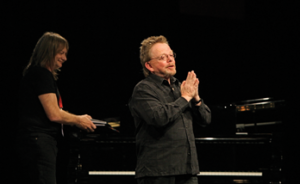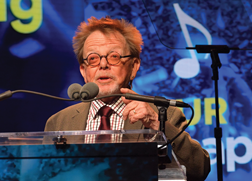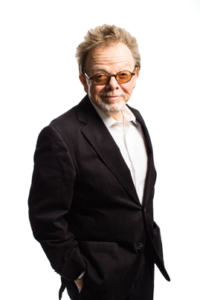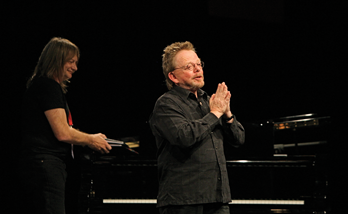 Today, singer, songwriter, and composer Paul Williams is a different man than he was at the height of his music career. Now President of ASCAP, Williams says that his two biggest passions are recovery and artists’ rights.
Today, singer, songwriter, and composer Paul Williams is a different man than he was at the height of his music career. Now President of ASCAP, Williams says that his two biggest passions are recovery and artists’ rights.
“March 15 I celebrated 26 years of continuous sobriety—the greatest gift I’ve ever been given,” he says. “At 49, I had misplaced a decade due to alcohol and cocaine addiction. I was a mess and I was dying. I asked for help and people came out of the woodwork—a choir of grateful hearts—recovering alcoholics and addicts. I began to connect with the world around me.”
Musician Buddy Arnald, founder of the Musicians Assistance Program (MAP), suggested the newly sober Williams spend a year in UCLA’s drug and alcohol counseling program. Afterward, Williams became a volunteer counselor at MAP’s offices that were located in AFM Local 47 (Los Angeles, CA), where Williams has been a member for 44 years.
“I felt really useful for the first time in years,” he says. “And isn’t it interesting that it was at Local 47 in Los Angeles that I found that feeling? Eventually, I fell in love with songwriting again. However, I think it’s remarkable that my career in music—the life and love of music that I had misplaced—I found again partly through the musicians union’s generosity.”
Q: How did the process of recovery change the way you thought about your career? How did it change you as a human being?
I became grateful. I began to see life as a gift. I began to feel connected to the world around me in ways I’d never really experienced before. Alcoholism is an isolating disease. We recover into a life of love and service. Those are important words to a recovering alcoholic. We get to keep the miracle by giving it away.
Writing became easier. I began to trust that the words and the music would come. I see the real magic in the process and I know the songs are a gift to me that I get to share. I think we have unseen allies. The muse has been very generous to me.
Q: What are some of the ways organizations like ASCAP or the AFM can help with the problem of musician substance abuse?
Organizations like ASCAP and AFM provide a community of peers. The ASCAP membership is strong. This community is a source of mentorship and learning, and one that I’m thankful for and proud to be part of. One of the things we provide at our EXPO every year is a safe harbor room for any attendee who needs the support.
Q: Why did you want to become president of ASCAP? Was there something you thought the organization should or could do differently when you took the helm?
I’ve been an ASCAP member since 1972. My friend Hal David—the great lyricist and former president of ASCAP—suggested that I run for the board in 2001. I was pretty uninformed for someone who made their living in music and counted on performance royalties to feed his family. The more I learned, the more impressed I became. I’ve come to love this remarkable organization.
Since its founding, ASCAP has been on the front lines fighting for the rights of its members. We are still the only PRO owned and run by creator members, and we’re proud to operate as a not-for-profit.
When I took over as president in 2009, I saw an opportunity to expand our message to include the first-person stories of our members. The songs and scores don’t write themselves. I wanted to put a face to the work. The antiquated music licensing system is having a severely negative impact on their ability to earn a fair wage for their craft. Everything starts with a song, and it’s important we tell this story to legislators and those in Washington, DC, who write the laws.
Q: Can you explain for AFM members how ASCAP and the AFM support each other’s missions? Why should performing songwriters belong to both?
The songs would be lifeless without the musicians’ art and craft. You bring our songs to life. Thank you. We really appreciate it. When music is performed there is a blanket licensing process that serves the music creator, the licensee, and the music lover. I was free to write a second song because ASCAP was collecting for my first.
AFM is dedicated to the interests of musicians, just as ASCAP is dedicated to the interests of publishers and songwriters. We both work to negotiate fair payments, protect the use of our members’ work, and advocate for policies that ensure a prosperous future for American music. Joining both organizations allows performing songwriters to enjoy the benefits of two of America’s most trusted advocates for music creators.
Q: Many AFM members have lost work in small venues due to the proprietors’ reluctance to pay SESAC, BMI, and ASCAP fees. Has ASCAP explored the idea of exempting or reducing fees for venues with small capacities?
We understand how essential music is to local businesses—it helps attract customers and drive revenue. But it’s also important that songwriters be compensated when their music is performed. In today’s marketplace, we depend on public performance royalties more than ever before to earn a living. ASCAP recently re-examined our fees, particularly for small venues, to ensure fairness and transparency across the system. The average cost of an ASCAP license for bars and restaurants amounts to a little over $2 a day. So for the equivalent of the cost of a cup of coffee, businesses can legally perform any of the millions of copyrighted works in the ASCAP repertory. Also, food service or drinking establishments under 3,750 gross square feet are exempt from licensing for radio or TV music uses.
 Q: As a leader in the music business, do you have any advice for young musicians?
Q: As a leader in the music business, do you have any advice for young musicians?
As music creators, we understand it’s a personal decision to join any professional organization. That’s why we’re honored when songwriters and publishers decide to join ASCAP, and we work tirelessly to support them, their music, and their rights.
My advice to young musicians would be to educate themselves about their rights and join an organization that has proven itself to be on the side of music creators; whether that’s AFM, ASCAP, or any other organization that is out there fighting to protect the future of this profession.
Q: I remember talking to one songwriter about how, when a song he wrote for a well-known country singer went viral on YouTube, he received only pennies. How can performers’ rights organizations better adapt to this new dynamic?
The framework of federal laws that governs how ASCAP and BMI operate was largely put in place in the 1940s. It’s a system that was created for a very different time and a very different marketplace. Today, a lot of digital music companies are exploiting these outdated music licensing laws in order to pay songwriters less than what their music is truly worth—or less than it would be in a truly free and fair marketplace.
The remedy, of course, is modernizing the ASCAP and BMI consent decrees to better reflect the way people listen to music today. ASCAP’s consent decree, for example, hasn’t been updated since before the iPod hit stores.
When I started out, it was possible to earn a decent living as a songwriter. Now, it’s a much riskier time. In today’s highly competitive music marketplace, it’s downright absurd that American songwriters—small business owners, in the truest sense—are more heavily regulated by the federal government than the giant corporations that use and profit from the music we create. This needs to change so that we can keep America’s music industry alive and thriving.
That’s why ASCAP is fighting for updates to our federal music licensing laws.
Q: Do you think we are losing diversity in songwriting due to the fact that fewer songwriters can earn a fair living?
The irony is, music is used more today than ever, yet our music licensing system rewards the billion-dollar streaming companies at the expense of the actual creators. I do think it’s having a negative effect on those who are thinking about joining this profession.
From a practical standpoint, it’s very risky to enter the music business as a songwriter today simply because there is so much standing in the way of being able to earn a fair wage. It still takes more than one million streams on Pandora for a songwriter to earn $100! Even when your song is a hit, it’s still a very risky business.
And that’s a shame, because if the profession can’t attract talent, it affects everyone downstream—record labels, recording artists, streaming companies, and music lovers alike.
 Q: How has your thinking about digital music changed as the industry has evolved?
Q: How has your thinking about digital music changed as the industry has evolved?
The advent of digital music has brought with it some great changes to the way people consume music—people are able to discover new artists with ease and carry their music with them everywhere they go. Personally, I think that’s a wonderful thing.
But as music users move from physical downloads to streaming, the royalties don’t cover the gap in what songwriters used to make. In 2015, ASCAP processed about 570 billion performances of our members’ music, a 14% increase from 2014, and more than double the number of performances tracked in 2013. But revenues and distributions have remained relatively flat in comparison. That’s because the majority of the growth is happening on streaming platforms, which pay songwriters far less. And that’s why we continue to push for reform. We need our licensing laws to reflect today’s technologies.
Q: Looking back on your career, knowing what you know now about life and the
music industry, what would you tell a younger version of yourself?
Be authentic. Tell us your story. Let us know who you are. When you dare to share something from the center of your chest—your most private thoughts about loneliness or love—you may be happily surprised by the number of people who identify with your emotions and find comfort in knowing they’re not alone.
I get very Jiminy Cricket about our work. But I’m a realist too. Having witnessed this incredible technological revolution in music, I could have never predicted that there would be such great inequities for the lifeblood of the industry—the music creators themselves.
If I were just starting out today, I’d tell myself the usual—find what inspires you, hone your craft. But just as important, I’d tell myself to get up to speed on copyright law; join the movement to modernize our music licensing system because these laws won’t correct themselves. We, as music creators, must fight for change.
Q: What song are you most proud of? Which song has the most personal meaning to you?
One of the high points of my career was working with Jim Henson. Kenny Ascher and I wrote the songs for The Muppet Movie. “The Rainbow Connection” has had a life beyond our wildest expectations. It’s really a song about the power of belief.
Who said that every wish would be heard and answered if wished on the morning star? Somebody thought of that … And someone believed it. Look what it’s done so far.
Q: What projects are you currently
working on?
I’m working on a musical with Gustavo Santaolalla. We’re writing the songs for a theatrical adaptation of Guillermo Del Toro’s Pan’s Labyrinth. He’s writing the music and then I am providing the lyrics. Incidentally, he’s brilliant. I’m so excited about this work.


